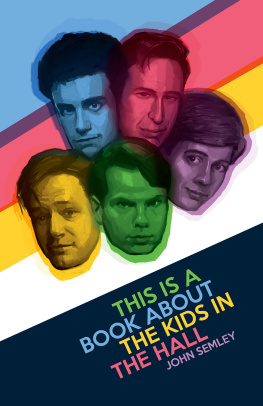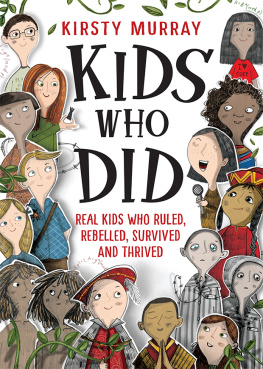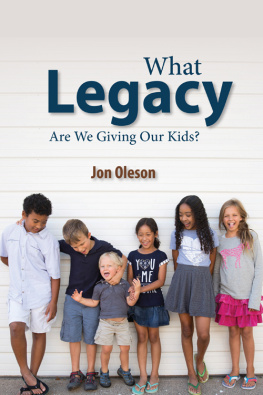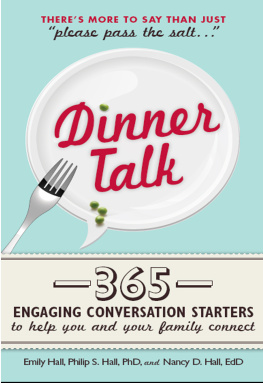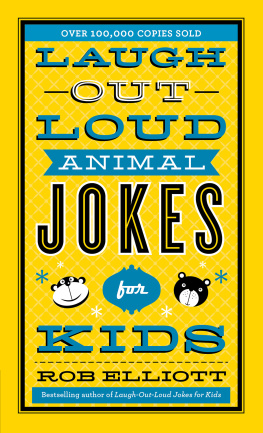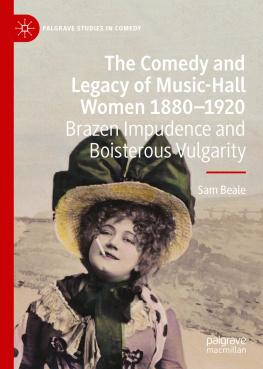Authors often dedicate books to either a lover or a pet, someone or something that stood by them during the long, arduous, sometimes tedious, often thankless labour of writing a book. Youre my rock, so-and-so! they proclaim.
Thing is: as of this writing, I dont have a wife or a girlfriend or a partner or a cat or anything. So, I guess Ill dedicate this book to my couch.
Couch, youre a good couch. As both an aesthetic object and a comforting place to unfold the whole of my carriage, youre just about the greatest darn couch there is. Thank you, couch, for abiding me and giving me a plush reprieve as I worked on this book, sometimes long into the night. Thank you for being there when I fell asleep watching old sitcom reruns and documentaries about the Second World War.
In case its not clear: as far as couches go, I think youre tops. I wish you were my son, so I could take you to hockey games and tell you I love you and have you hear it, instead of just mumbling it unreciprocated into your cozy but crushingly ambivalent cushions at half past three in the morning.
It also seems weird not to dedicate this book, in some way, to the people who inspired it, and who have given me so much joy and laughter since pretty much as far back as I can remember. So: to the Kids in the Hall.
Oh, and also: to Reg.
My god, he could skate.
FIVE BASSISTS
By Means of an Introduction
If you ever have the chance to attend a live taping of a TV show, heres a hot tip: dont.
Pinewood Studios in Toronto is the epicentre of what people used to call Hollywood North. The sprawling film and television production complex covers some twenty acres, just east of the citys downtown core. Boasting a dozen stages, a backlot carved out of a muddy berm, workshops, wardrobe rooms, meeting and conference facilities, art departments, its own movie theatre, and, maybe most notably, North Americas largest purpose-built sound stageits 45,900 square feet, and its where they shot the massive-budget blockbuster remakes of Total Recall and Robocop, and walking through it you feel totally dwarfed and insignificant, in a meaningful, existential way, like a Romantic poet gazing out over a precipicePinewoods the glossy, decked-out hub of Canadian film and TV production.
Walking across the tarmac, it feels like a movie studio. Bespectacled men in headsets dart around, racks of costumes slouch against concrete walls, those boxy covered golf carts ferry Big Important Movie Bigwigtype so-and-sos hither and yon, so they can attend to the Big Important Movie Business of ruining a cherished robotic policeman franchise for everyone.
Located on a stretch of property in Torontos Port Lands, between an industrial shipping lane and a bunch of quarries, adjacent to some barely marked waste management facilities, Pinewoods glossy Tinsel Town glamour is undercut by how wholly industrial it feels. This is a place where things get made. Its where products are turned out. Its a movie and TV factory. Its a lousy place to find yourself stuck, for five-plus hours, pretending to laugh at a joke that youve heard repeated fourteen times. And on the evening of July 19, 2013, a friend and I learned our lesson.
At the time, I was working on a profile of Canadian comedian and actor Dave Foley for a monthly magazine. Foley had returned to Canada to star in Spun Out, a sitcom about a PR agency designed to slot seamlessly into CTVs weeknight TV lineup of The Big Bang Theory (Canadas #1 Comedy, as the billboards constantly brag), Two and a Half Men (Canadas #2 comedy, a much less-advertised distinction), and other U.S. network imports like Anger Management and Mike & Molly.
Foleys return to Canadian TV was conspicuous. Hed been very vocal in the press about what he called the ransom: child support payments owed to an ex-wife. The sums of these payments, he says, were calculated at the peak of the actors fame and wealth and no longer reflected his current earnings. Foley suspected (and quite seriously, it seems) that by even setting foot in his native Canada, he might risk jail time for not ponying up all the money he had been court ordered to pay. Enter Spun Out: a show developed with the help of Foleys lawyer. They basically got together and figured out what it would take for me to come up here without going to jail, Foley explains.
As homecomings go, Spun Out was a cynical one.
Spun Outs the kind of innocuous, hopelessly oldfangled sitcom that feels like it was made from a ready-mix formulatake three cameras, a workplace setting, a cast of stock characters, and some cartoonishly snappy one-liners; just add water and a laugh track. Its the sort of prime-time program where, while youre watching it, a superimposed photo-bumper slides up from the bottom of the screen, showing you a photo of the same characters youre already watching, providing you with an insistent on-screen reminder that YOURE WATCHING SPUN OUT. At the risk of sounding uncharitable, its what those in the film and TV criticism game might call a bad show.
In order to gain some insight into Spun Out, and Foleys role, for the profile, I was invited to sit in on a live taping of the show. Lukewarm on the prospectdespite the tantalizing promise of free pizzaI invited a friend who works as a writer on a number of Canadian TV shows.
In our naivet, we marshalled our cheery enthusiasm. Enthusiasm for free pizza, yes. But also for something else. Because the episode that was being filmed before the live studio audience of which Id find myself a partjust another forced laugh and smattering of applause in a sea of mock chortling and increasingly fatigued hand-slappingfeatured very special guest stars: the rest of Dave Foleys comedy troupe, the Kids in the Hall.
Titled, appropriately enough, Middle Aged Men in the Hall, the episodes premise was encouragingly macabre for a network sitcom. On the cusp of his fiftieth birthday, Foleys Dave Lyons is visited by his estranged high-school buddies, who arrive still clad in the trappings and suits of teenage woe. Like ghosts of high-school past, his friends havent changed since their heydays of sullen adolescence. Dressed in baggy, billowy blacks and deep, byzantium purples, sutured in by criss-crossing buckles and zippers, pasty and pouting under feathery hairdos, the remaining KidsKevin McDonald, Scott Thompson, Mark McKinney, and Bruce McCullochhave arrived in the Spun Out universe to make good on a pact.
As teens, the characters had all agreed that once the last of their friend group turned fifty, theyd all commit suicide together, in a grand gesture of high-school goth camaraderie. It was a storyline I pitched, explains Foley. I wanted it to be something that would suit the Kids. Something that would feel like a Kids in the Hall story.
With Foleys character the last remaining middle-ager to crest into fifty, the crew arrives so the five friends can take their lives together, like theyd always planned. One notable scene includes a desperate McCulloch literally being talked off a ledge, where it turns out hes just smoking a cigarette (Some people dont inhale; I dont exhale). In another, McKinney has a line about contemplating the mind-numbing existence of a godless universe. Like I said, pretty dark.

